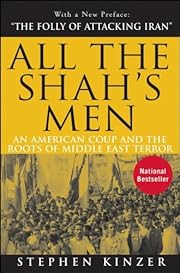

Fai clic su di un'immagine per andare a Google Ricerca Libri.
|
Sto caricando le informazioni... All the Shah's Men: An American Coup and the Roots of Middle East Terror (2003)di Stephen Kinzer
 Sto caricando le informazioni...
Iscriviti per consentire a LibraryThing di scoprire se ti piacerà questo libro. Attualmente non vi sono conversazioni su questo libro.   ) )All the Shah's Men provides a detailed account of the Iranian political climate in the late 1940s and early 1950s, as well as a broader summary of its earlier history. The circumstances leading to U.S. involvement in what began as a dispute between Iran and Great Britain are also given thorough attention. Most importantly, Kinzer draws a direct line between the CIA's secret (at the time) 1953 coup to overthrow Iranian Prime Minister Mohammad Mosaddegh and the strained relationship between the U.S. and Iran that has followed the 1979 Iranian Revolution. Prior to the coup, the U.S. was seen as an ally in the region, a protector of national interests and resources -- or least more fair than the traditional imperialist attitude still portrayed by Great Britain. By displacing Mosaddegh, a secularist, the nationalist and Islamist movements converged against a common enemy -- the Shah and his neo-imperalist supporters, Great Britain and the U.S. As Kinzer described the Dulles brothers' strategy to persuade President Eisenhower that the coup was necessary, I had the sense of viewing a horror movie heroine poised to open a door that the audience knows conceals the movie's villain. If only we had shown more restraint in 1953, we may have prevented Iran's transformation from a budding democracy into a hostile and theocratic state. You can read others for a summary of the book - or, the title pretty much says it all. What is most important, however, especially where we are today with sanctions against Iran is a replaying of the horrors we inflicted on this country. The aftermath of what we did to them is clear and their anti-American sentiment is justified and understandable. So, knowing all this, what the hell are we doing? Why are we allowing this to happen again to this country? These sanctions and willy-waving war imbued rhetoric will not work against them, they've already suffered it once. History repeats itself and we have rapacious leaders with hegemonic desires and our own collective ignorance to blame. This book is something that everyone should read, and I believe you don't have a right to an opinion about Iran and today's issues related to Iran (as well as other issues in the Middle East which ultimately all come home to roost) without reading a book like this. This book was a real joy to read and by the end of it I felt such anger and resentment toward the US and especially Britain, and it's happening all over again. These poor people must think, "why are they doing this to us?" The reason is clear: oil. I can't recommend this book highly enough. It's my second Stephen Kinzer book and even more enjoyable than the other book of his I read (Overthrow). Read this book!
Sure enough, ''All the Shah's Men'' reads more like a swashbuckling yarn than a scholarly opus. Still, Kinzer, a New York Times correspondent now based in Chicago, offers a helpful reminder of an oft-neglected piece of Middle Eastern history, drawn in part from a recently revealed secret C.I.A. history. Premi e riconoscimenti
Half a century ago, the United States overthrew the democratically elected prime minister of Iran, Mohammad Mossadegh, whose "crime" was nationalizing the country's oil industry. In a cloak-and-dagger story of spies, saboteurs, and secret agents, Kinzer reveals the involvement of Eisenhower, Churchill, Kermit Roosevelt, and the CIA in Operation Ajax, which restored Mohammad Reza Shah to power. Reza imposed a tyranny that ultimately sparked the Islamic Revolution of 1979, which, in turn, inspired fundamentalists throughout the Muslim world, including the Taliban and terrorists who thrived under its protection."It is not far-fetched," Kinzer asserts, "to draw a line from Operation Ajax through the Shah's repressive regime and the Islamic Revolution to the fireballs that engulfed the World Trade Center in New York.". Non sono state trovate descrizioni di biblioteche |
Discussioni correntiNessunoCopertine popolari
 Google Books — Sto caricando le informazioni... Google Books — Sto caricando le informazioni...VotoMedia: (4.06) (4.06)
Sei tu?Diventa un autore di LibraryThing. |
|||||||||||||||||||||||||||||||||||||||||||||||||||||||||||||||||||||||||||||||||||||||||||||||||||||||||||||||||||||||||||